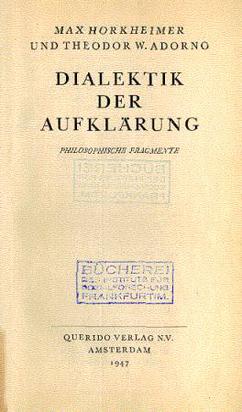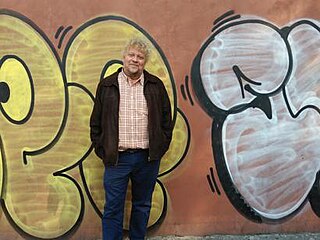Related Research Articles
The following outline is provided as an overview of and topical guide to critical theory:

Max Horkheimer was a German philosopher and sociologist who was famous for his work in critical theory as a member of the Frankfurt School of social research. Horkheimer addressed authoritarianism, militarism, economic disruption, environmental crisis, and the poverty of mass culture using the philosophy of history as a framework. This became the foundation of critical theory. His most important works include Eclipse of Reason (1947), Between Philosophy and Social Science (1930–1938) and, in collaboration with Theodor Adorno, Dialectic of Enlightenment (1947). Through the Frankfurt School, Horkheimer planned, supported and made other significant works possible.

Theodor W. Adorno was a German philosopher, sociologist, psychologist, musicologist, and composer.

The Frankfurt School is a school of social theory and critical philosophy associated with the Institute for Social Research, founded at Goethe University Frankfurt in 1923. Active in the Weimar Republic during the European interwar period, the Frankfurt School initially comprised intellectuals, academics, and political dissidents dissatisfied with the contemporary socio-economic systems of the 1930s. The Frankfurt theorists proposed that social theory was inadequate for explaining the turbulent political factionalism and reactionary politics occurring in 20th-century liberal capitalist societies, such as Nazism. Critical of both capitalism and of Marxism–Leninism as philosophically inflexible systems of social organization, the School's critical theory research indicated alternative paths to realizing the social development of a society and a nation.
The term culture industry was coined by the critical theorists Theodor Adorno (1903–1969) and Max Horkheimer (1895–1973), and was presented as critical vocabulary in the chapter "The Culture Industry: Enlightenment as Mass Deception", of the book Dialectic of Enlightenment (1947), wherein they proposed that popular culture is akin to a factory producing standardized cultural goods—films, radio programmes, magazines, etc.—that are used to manipulate mass society into passivity. Consumption of the easy pleasures of popular culture, made available by the mass communications media, renders people docile and content, no matter how difficult their economic circumstances. The inherent danger of the culture industry is the cultivation of false psychological needs that can only be met and satisfied by the products of capitalism; thus Adorno and Horkheimer perceived mass-produced culture as especially dangerous compared to the more technically and intellectually difficult high arts. In contrast, true psychological needs are freedom, creativity, and genuine happiness, which refer to an earlier demarcation of human needs, established by Herbert Marcuse.

Dialectic of Enlightenment is a work of philosophy and social criticism written by Frankfurt School philosophers Max Horkheimer and Theodor W. Adorno. The text, published in 1947, is a revised version of what the authors originally had circulated among friends and colleagues in 1944 under the title of Philosophical Fragments.

Axel Honneth is a German philosopher who is the Professor for Social Philosophy at Goethe University Frankfurt and the Jack B. Weinstein Professor of the Humanities in the department of philosophy at Columbia University. He was also director of the Institut für Sozialforschung in Frankfurt am Main, Germany between 2001 and 2018.

Alfred Schmidt was a German philosopher.
In sociology, communicative action is cooperative action undertaken by individuals based upon mutual deliberation and argumentation. The term was developed by German philosopher-sociologist Jürgen Habermas in his work The Theory of Communicative Action.
The positivism dispute was a political-philosophical dispute between the critical rationalists and the Frankfurt School in 1961, about the methodology of the social sciences. It grew into a broad discussion within German sociology from 1961 to 1969. The naming itself is controversial, since it was the Frankfurt School proponents who accused the critical rationalists of being positivists—while the latter considered themselves to be opponents of positivism.
Else Frenkel-Brunswik was a Polish-born Austrian Jewish psychologist. She was forced to leave Poland and later Austria as a result of anti-Jewish persecution. She is best known for her contributions to The Authoritarian Personality (1950), her collaboration with Theodor W. Adorno, Daniel Levinson, and Nevitt Sanford. It is considered a milestone work in personality theory and social psychology.

Leo Löwenthal was a German sociologist and philosopher usually associated with the Frankfurt School.
Christian Lotz is a German-American professor of philosopher at Michigan State University. Lotz's work primarily focuses on 19th and 20th Century European philosophy, continental aesthetics, critical theory, Marxism, and contemporary European political philosophy.

A critical theory is any approach to social philosophy that focuses on society and culture to attempt to reveal, critique, and challenge power structures. With roots in sociology and literary criticism, it argues that social problems stem more from social structures and cultural assumptions than from individuals. It argues that ideology is the principal obstacle to human liberation. Critical theory finds applications in various fields of study, including psychoanalysis, sociology, history, communication theory, philosophy and feminist theory.

Stefan Gandler is a philosopher and social scientist. He studied at Frankfurt University and has lived in Mexico since 1993
Hilda Weiss was a sociologist, trade unionist, and socialist. She lived in Germany until 1933 when Hitler came to power, then escaped to France. In 1939 she emigrated to the United States and lived there until her death in 1981.
Gretel Adorno was a German chemist and intellectual figure within the Frankfurt School of critical theory.
Claudia von Werlhof is a German sociologist and political scientist. She held the first professorship for women's studies in Austria, based at the Institute for Political Science at the University of Innsbruck.
Peter Václav Zima is a literary critic and a social scientist born in Prague 1946. He is of Czech-German origin and has dual nationality such as Austrian and Dutch. He is emeritus professor of the Alpen-Adria-Universität in Klagenfurt (Austria) where he held the chair of General and Comparative Literature from 1983 to 2012.
References
- ↑ Cf. Muharrem Acikgöz: Die Permanenz der kritischen Theorie: die zweite Generation als zerstrittene Interpretationsgemeinschaft, Münster 2014, p. 222.
- ↑ Cf. Gudrun-Axeli Knapp: Kritische Theorie. Ein selbstreflexives Denken in Vermittlungen, in: Becker/Kortendiek 2004.
- 1 2 Cf. Muharrem Acikgöz: Die Permanenz der kritischen Theorie: die zweite Generation als zerstrittene Interpretationsgemeinschaft, p. 223.
- 1 2 3 4 5 Umrath, Barbara. "Feminist Critical Theory in the Tradition of the Early Frankfurt School: The Significance of Regina Becker-Schmidt". The Interdisciplinary Journal of The New School for Social Research. Retrieved 20 May 2015.
- ↑ Horkheimer, Max; Adorno, Theodor W.; Noeri, Gunzelin (2002-01-01). Dialectic of Enlightenment. Stanford University Press. ISBN 9780804736336.